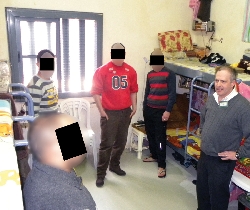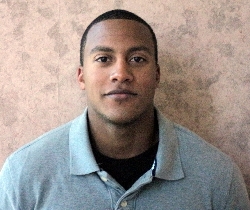University News
WIU Terrorism Expert Helps Homeland Security Students Get Global Perspectives
August 30, 2011
Since 2007, to supplement its reputed law enforcement and justice administration major, WIU's School of Law Enforcement and Justice Administration has been offering a minor in homeland security. This minor emphasis of study can provide a major impact for the future law enforcement professionals who are preparing for the realities of working in a post-9/11 world.
MACOMB, IL -- For Dean Alexander and other faculty members in the Western Illinois University of School of Law Enforcement and Justice Administration (LEJA), the ways the homeland security, law enforcement and intelligence fields have evolved in the 10 years since September 11, 2001, have not only led to the School's Homeland Security Research Program (HSRP), but also resulted in the creation of a minor in homeland security. Alexander -- who studies individuals who become terrorists and the factors related to how they are radicalized -- is an associate professor in WIU's School of LEJA. He and his fellow faculty members who teach homeland security courses offer Western's LEJA students a curriculum that helps them prepare for their future law enforcement careers in which they are likely to have to respond to homeland-security threats, both domestic and abroad.
"We started the homeland security minor about five years ago from nothing, really, and we have grown it significantly in its short existence. We now have close to 150 students declaring it as their minor area of study," he said.
Alexander also serves as the director of the Homeland Security Research Program at WIU. He noted the HSRP provides a platform through which students majoring in LEJA and minoring in homeland security can get exposure -- from collaborative research and instructional exchanges -- to global perspectives.
"In October last year, the HSRP hosted the panel discussion, 'Terrorist Threats in the AfPak-India Region and Its Implications for the U.S.' on the WIU-Macomb campus," he noted. "The discussion provided WIU LEJA students with perspectives from WIU faculty, as well as visiting Notre Dame College faculty, whose areas of study include military-based counterterrorism operations, intelligence studies and terror financing."
As part of his work as the HSRP director and a faculty member in WIU's School of LEJA, Alexander often travels overseas in pursuit of his study of terrorists, as well as to present, as an invited lecturer, his research findings at NATO's Centre of Excellence -- Defense Against Terrorism in Ankara, Turkey. Since 2010 Alexander, on three different occasions, has presented lectures covering law enforcement responses to terrorism; terror financing; legal aspects of terrorism; the organized crime/terror nexus; and cyberterrorism at the NATO Centre in Turkey. This Saturday (Sept. 3) he is scheduled to travel to Romania, where he will present on insurgent radicalization and recruitment, the impact of instability of reconstruction and economic development and social structures in conflict zones at an inaugural workshop organized by NATO's new HUMINT Centre of Excellence.
Alexander, who has authored eight books and numerous articles, earned a Master of Laws (LL.M.) degree from Georgetown University Law Center (1991) and his Juris Doctor (J.D.) from American University, Washington College (1990). He often provides his domestic jihadism expertise to media outlets in Illinois and across the U.S. He also has served as a consultant to the State Department, and in December 2007, Security Magazine designated him as a "Top 25 Influential Person in the Security Industry."
"Through my work in the field, my research, instruction at WIU and the lectures I present at other organizations, I'm trying to instill the need for a measured approach, when it comes to handling -- and preventing -- terrorism. Of course, there is the issue of how does a nation respond to a large-scale terrorist attack? Indeed, military power is important, but terrorism has been around for thousands of years. We, as law enforcement professionals, need to appreciate that terrorism has occurred, is occurring and will occur, and it's something we live with, like crime. Our response must be measured. When all of our economic policies, military policies and social policies are crafted in response to some extremists, I think that's an exaggeration. Then, we really are falling into their hands -- they are dictating what we do," Alexander explained.
One of the many ways Alexander tries to expose his students to varying perspectives in homeland security practice is to encourage them to apply for activities and programs offered outside of WIU.
"I provide them with information about national security jobs, national security language programs and many other types of internship and professional-development opportunities," he noted. "We've had students intern at the Statewide Intelligence Center, as well as others who are doing other homeland security-related work in various programs offered through nationally recognized institutions and organizations," Alexander said.
Junior LEJA major and homeland security minor Jonathan Bilotti (Highland Park, IL) is one of his students who has taken advantage of Alexander's mentoring and his encouragement. This past summer Bilotti was one of only a few students nationwide selected to take part in a competitive 10-week Homeland Security Summer Scholars Academy: Undergraduate Research Program at the University of Texas at El Paso.
"Professor Alexander has played a major role in helping me choose from several career paths of interest and shared information about both national and international security careers," Bilotti said. "With his support, I have been motivated to strive for, and achieve, exceptionally high standards in all my studies."
Bilotti added that Alexander was integral to his application to, and acceptance into, the program offered via the Department of Homeland Security Science and Technology Directorate Center of Excellence, where he spent his summer learning homeland security practice first hand.
"He encourages all of his students to apply for internships, apply for scholarships and study foreign languages. For me personally, he encouraged and helped me to attain my internship this past summer. He provided me with outstanding mentorship and advice during my application process, as well as a letter of recommendation. Professor Alexander has taught and encouraged me to meet challenges that I had never before thought I could achieve," he said.
"All Aspects and Angles"
Bilotti also noted that, during his time at WIU so far, he has been able to take a few courses with Alexander, which have covered subject material "ranging from global issues in terrorism to homeland security, including the legal aspects of homeland security." His mentor, Bilotti said, "supports tackling matters from all aspects and angles. Professor Alexander has a gift of being able to make complex subjects understandable."
Alexander's work also has recently taken him to Israel to meet with individuals convicted of terrorist activities. Last March, he spent a few days interviewing Hamas and Fatah prisoners incarcerated in an Israeli prison in Beersheba.
"Through the interviews, I can gain a better understanding of their perspectives. They consider themselves political prisoners, while the Israeli government considers them security prisoners or terrorists," Alexander said. "Meeting and talking with them allows me to try to understand their different ideological positions. Many people think these individuals are crazy, but they have their own perspectives, and these points of view are ingrained through ideology, based on various factors, including both political and religious. They have certain goals, and to meet their goals, they feel they need to utilize violence. But the simplistic notion these people are crazy, well, I think that's a mistake. If you go with that perspective, then you don't understand the conflict, and then any solutions you try to craft, can't really work," he added.
Alexander's trip to Israel last spring included a tour of Gaza, as well as an academic exchange with Sapir College, located in Sderot, Israel. While there, he delivered three lectures to three different classes of students attending Sapir, fulfilling a reciprocal agreement WIU's Homeland Security Research Center had with Sapir. In Fall 2010, Alexander's colleague, Uri Rosset, an assistant professor at Sapir College and an Arabic analyst at Intuview (an Israeli company that develops software for security and defense applications), visited both the Macomb and Quad Cities campuses to address WIU LEJA students and faculty, as well as regional law enforcement professionals. Rosset delivered two lectures, "Moderate and Radical Elements in the Middle East" and "Israeli Counterterrorism Policies," during his time in western Illinois.
Through this type of exchange program via the HSRP, Alexander noted, students and faculty in WIU's School of Law Enforcement and Justice Administration benefit from the counterterrorism expertise of international academics and practitioners. On the flip side, students at Sapir are also exposed to the expert-level homeland security instruction and research occurring in WIU's reputed School of LEJA.
"There are many progenitors for terrorism -- it doesn't occur only due to one reason," Alexander said. "It's a multi-faceted problem that needs multi-pronged responses, and implementing one type of approach is not adequate. There are roles to be played by educational institutions, religious institutions, social institutions, the role of industry and there is also the role of family. Providing a variety of perspectives for our students to consider meets one of our goals to guide their intellectual development to the highest degree."
For more information about WIU's School of Law Enforcement and Justice Administration visit wiu.edu/coehs/leja/. Alexander can be reached via email at DC-Alexander@wiu.edu.
Learn more about Alexander's work at WIU and the Homeland Security Research program at wiu.edu/coehs/leja/faculty_staff/alexander.php.
Posted By: Teresa Koltzenburg (WIUNews@wiu.edu)
Office of University Communications & Marketing



Connect with us: